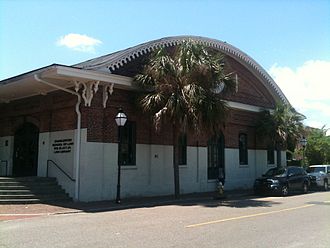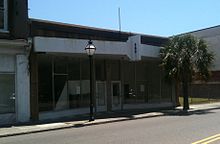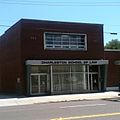- Charleston School of Law
-
Charleston School of Law 
The Charleston School of Law's library is housed in an antebellum building at 81 Mary Street.Motto Pro bono populi Motto in English For the good of the people Established 2003 Type Private law school Dean Andrew "Andy" L. Abrams Students 480 (full time)[citation needed]
160 (part time)[citation needed]Location Charleston, South Carolina, United States
32°47′26″N 79°56′18″W / 32.79056°N 79.93833°WCoordinates: 32°47′26″N 79°56′18″W / 32.79056°N 79.93833°WCampus Urban Colors Charleston green and gold Website charlestonlaw.edu The Charleston School of Law is a for-profit private law school located in Charleston, South Carolina, established in 2003. The school was fully accredited by the American Bar Association (ABA) in August 2011.[1]
Contents
History
Inspiration and establishment
Despite Charleston being the early capital of South Carolina and the location of the first college in the state, no modern law school existed in the city until 2003. In November 1825, a group of Charleston attorneys had petitioned the South Carolina General Assembly for a charter of incorporation for the creation of a regular "Law Institute" in Charleston and a law library. They had also established a lectureship on the law. In December 1825, the legislature granted a charter, and the Forensic Club began offering lectures on the law in February 1826. The Forensic Club — a private organization chartered to offer lectures in the law in Charleston — operated for two years, but it never took the form of a modern law school.
In 2002, prominent Charleston judges and attorneys started to work on establishing a law school in Charleston. The school would be the first organized effort to offer instruction in the law in Charleston since the 1828 dissolution of the Forensic Club. The five founders were the Honorable Alex Sanders (a former president of the College of Charleston and a former Chief Judge of the South Carolina Court of Appeals); Edward J. Westbrook (a prominent lawyer in Charleston); the Honorable Robert Carr (a U.S. magistrate judge); the Honorable George Kosko (a U.S. magistrate judge until 2008)[2] and Ralph McCullough (another well-known South Carolinian attorney). In 2003, the South Carolina Commission on Higher Education granted a license to allow the school to start accepting students in Fall 2004.[3] For one year before the renovation of the school's first building, 81 Mary St., was completed, the school operated out of 560 King St.
The Charleston School of Law was founded in 2003.
ABA accreditation
In South Carolina, only graduates of ABA-accredited law schools may sit for the bar exam. Students graduating from a provisionally accredited law school enjoy the full rights guaranteed to fully accredited schools, including the right to sit for the bar exam.[4] In October 2005, the ABA sent a special delegation to review the progress of the law school.[5]
In April 2006, the ABA's Accreditation Committee recommended provisional accreditation, but its final authority (the ABA's Council of the Section of Legal Education and Admissions to the Bar) deferred a vote on the committee's recommendation until December 2006. The school was asked to address questions related to the institution's governance, library resources, and commitment to diversity. The delay was a problem since the deadline for registering for the bar exam was January 2007.
On December 2, 2006, however, the school announced that the ABA had granted it provisional accreditation, the highest level of accreditation available at that time. Full accreditation cannot be granted until a school has been in operation for five years.[6]
On August 5, 2011, Dean Andy Abrams announced that the ABA had granted the school full accreditation.[7]
School's first graduation
On May 19, 2007, the school's first class of 186 students graduated at a ceremony held at The Citadel, The Military College of South Carolina, also located in Charleston.[8] Former U.S. Senator Ernest Hollings delivered the main address. He; the Honorable Jean H. Toal, Chief Justice of the South Carolina Supreme Court; and the Honorable William Walter Wilkins, Chief Judge of the U.S. Court of Appeals for the Fourth Circuit received LL.D. honorary degrees.
With the blessing of the descendents of the organizers of the original Forensic Club, the school organized an honorary society also known as the Forensic Club. In its current form, up to four students are inducted into the group each year from the graduating class based on the recommendation of the faculty and approval by the founders. The first four inductees were Cameron Blazer, M. Brooks Derrick, Charles Marchbanks and Jeff Yungman.[9]
Post-graduation information
Law School Transparency reports the following statistics for the Class of 2009 graduates: 29.3% worked for private law firms, but 62.3% had jobs requiring bar passage nine months after graduation.[10] Sixteen and one-tenth percent were either unemployed or had an unknown employment status nine months after graduation.[11] These unaudited employment statistics are self-reported by the Charleston School of Law to U.S. News & World Report.[12]
The average Class of 2009 graduate had $128,571 of student loan debt.[13]
Admissions
The following tables reflect admissions information arranged by the year of admission, not by year of graduation.
Full-time 2004 2005 2006 2007 2008 2009 2010 2011[14] Applications N/A 952 835 912 870 2050 2200 1784 Accepted N/A 32% 38% 35% 34% 38% 39% 51% Enrolled N/A 138 137 130 134 190 188 173 75% LSAT/GPA N/A 151/3.48 152/3.41 153/3.51 154/3.49 156/3.43 156/3.46 155/3.42 Median LSAT/GPA N/A 150/3.08 151/3.16 152/3.20 153/3.18 154/3.20 155/3.25 153/3.20 25% LSAT/GPA N/A 150/2.79 152/2.81 153.2.96 153/2.96 151/2.95 152/2.95 150/2.91 Part-time 2004 2005 2006 2007 2008 2009 2010 2011[15] Applications N/A N/A 250 250 240 350 350 270 Accepted N/A N/A 33% 44% 41% 31% 29% 40% Enrolled N/A N/A 62 66 71 52 50 51 75% LSAT/GPA N/A N/A N/A 153/3.43 152/3.34 152/3.30 153/3.37 151/3.30 Median LSAT/GPA N/A N/A N/A 150/3.08 150/3.07 151/2.92 151/3.04 147/2.84 25% LSAT/GPA N/A N/A N/A 148/2.81 147/2.71 147/2.51 149/2.80 146/2.50 South Carolina bar-exam passage
In South Carolina, the bar exam is administered twice a year, in July and February. July is the primary testing date for those who graduate in May. A much smaller group, generally out-of-state applicants, repeat takers, and December graduates, take the February exam. The school graduated its first students in May 2007 who sat for the exam in July 2007. The following are the pass rates for school alumni for each South Carolina bar exam since July 2007.
February July 2007 --- 69.9%* 2008 47.9% 72.2% 2009 53.7%[16] 75.9%[17] 2010 60.0%[18] 72.3%[19] 2011 63.5%[20] 75.0%[21] * The July 2007 results were revised upwards (from an original 65 percent rate) after the South Carolina Supreme Court threw out a section of the exam because of an error by a bar examiner.[22]
Student body
The median age of first-year, full-time students at the school is twenty-three years; however, students range from age twenty to fifty-one. About half of the full-time student body (56 percent) are South Carolina residents. Males outnumber females in the full-time program by a 52–48 margin.
Other information
On November 29, 2007, the school's first dean, Richard Gershon, announced he would be leaving the post to return to full-time teaching at the school. He was awarded an honorary LL.D degree in May 2008 for his leadership.
In December 2007, Andrew "Andy" L. Abrams, a professor at the school and a former provost for the College of Charleston, was named as the school's interim dean. In June 2008, Abrams became the school's second dean.[23]
Facilities
The Charleston School of Law's library shares an antebellum building with the Music Farm, a musical concert venue.
When the law school was first organized in 2003, the school was operated out of a building at 560 King St. (pictured above) while work progressed on its future location. Although the school left that building within one year, the school's physical plant has always been located in Charleston's Upper King Street district. During its first year in operation, the school was located at 81 Mary St. (pictured above), in an antebellum railroad station. That building continues to serve as the school's law library, while most classrooms, offices, and other uses have moved to new locations as the school has grown and acquired new space. The school has leased space in nearby buildings including the Chase Building at 414 King St. (designed by Augustus Constantine, c. 1948);[24] a large portion of the AT&T Building at the southwest corner of Mary and Meeting Streets;[25] administrative space at 394 Meeting St., and suites of offices at both 440 and 444 King St. for its IT department and career services offices.
Publications
Charleston Law Review
The Charleston Law Review is a journal published by an independent organization composed of second- and third-year students at the school. The organization's primary objective is to foster the knowledge and insight of students, practitioners, scholars and the judiciary through a traditional forum dedicated to the pursuit of innovative legal expression, composition and scholarship. Members of the organization contribute to this objective by editing articles, writing notes, and actively participating in all aspects of the publication process.
Its inaugural journal, released in Fall 2006, featured five articles by legal scholars on topics ranging from human trafficking to preservation of Gullah-Geechee culture. It published a second issue devoted to student works in Spring 2007.
The foreword of Volume 2, Issue 1 (Fall 2007) was written by U.S. President Barack Obama, who, at the time, was a U.S. Senator from Illinois and a leading candidate for the Democratic Party nomination in the 2008 U.S. presidential election.[26]
Sara Ruff was the inaugural editor-in-chief (2006–2007). Subsequent editors-in-chief have been George "Matt" Kendall (2007–2008) and Katie Fowler (2008–2009). Ben Garner is the editor-in-chief for (2009–2010).
Federal Courts Law Review
Founded in July 1997, the Federal Courts Law Review is an electronic law review dedicated to legal scholarship relating to federal courts. Articles are from scholars, judges and distinguished practitioners. Its editorial board, composed primarily of U.S. magistrate judges and law-school professors, to combine the insight of the federal judiciary with the perspective of law-school academics.
The school was selected in 2005 by the Federal Magistrate Judges Association to oversee the publication of a printed version of the Federal Courts Law Review.[27] This companion to the current online format is intended to cater to subscribers who would welcome a printed version. The printed version will also allow for inclusion of selected student works.
Maritime Law Bulletin
The Maritime Law Bulletin (MALABU) is a periodical bulletin, edited by law students, focusing on significant maritime issues. First published in February 2006, the bulletin is the publishing arm of the school's Charleston Maritime Law Institute.
The institute is a collaborative effort involving students, professors and leading maritime lawyers and professionals from around the Southeastern U.S.. In addition to promoting maritime legal studies at the school, the institute will provide programs and seminars periodically on maritime matters.[28]
Resolved: Journal of Alternative Dispute Resolution
Resolved is a student-run e-Publication that was founded in conjunction with the Center for Dispute Resolution. The Center's vision in creating Resolved is to promote research and writing in the areas of dispute resolution theory, skills, techniques and application. Resolved provides a comprehensive resource that fosters intellectual discourse amongst the judiciary, professors, students, mediators and attorneys through a contemporary medium. [29] Resolved is dedicated to increasing awareness of alternative dispute resolution trends and sharing thought-provoking viewpoints. Megan Hunt was the inaugural editor-in-chief.[30] Subsequently, Justice Perkins was editor-in-chief for 2010–2011 [31] and M. Christie McDonnell is the editor-in-chief for 2011–2012.[32] The website for Resolved is located at: http://adrepub.charlestonlaw.edu/
References
- ^ Behre, Robert (August 6, 2011). "School of Law clears Bar hurdle". The Post and Courier. http://www.postandcourier.com/news/2011/aug/05/charleston-school-law-receives-accreditation/. Retrieved August 7, 2011.
- ^ Smith, Glenn (January 3, 2008). "Fellow Judges Deny Kosko a New Term". The Post and Courier. http://archives.postandcourier.com/archive/arch08/0108/arc01235683155.shtml. Retrieved May 24, 2009.
- ^ Behre, Robert (July 9, 2004). "New Charleston College, Law School Pass State Test". The Post and Courier. http://archives.postandcourier.com/archive/arch04/0704/arc07091814914.shtml. Retrieved June 5, 2009.
- ^ "The American Bar Association Law School Approval Process". American Bar Association. August 2007. http://www.abanet.org/legaled/accreditation/abarole.html.
- ^ Kropf, Schuyler (October 19, 2005). "Bar Association Accreditation Team Takes Look at Charleston School of Law". The Post and Courier. http://archives.postandcourier.com/archive/arch05/1005/arc10192629116.shtml. Retrieved June 5, 2009.
- ^ Knich, Diane (December 6, 2006). "School of Law Gets the Go-Ahead". The Post and Courier. http://archives.postandcourier.com/archive/arch06/1206/arc12033665179.shtml. Retrieved June 5, 2009.
- ^ Behre, Robert (August 6, 2011). "School of Law clears Bar hurdle". The Post and Courier. http://www.postandcourier.com/news/2011/aug/05/charleston-school-law-receives-accreditation/. Retrieved August 7, 2011.
- ^ Knich, Diane (May 20, 2007). "A Class of Pioneers". The Post and Courier. http://web.charleston.net/news/2007/may/20/a_class_pioneers/. Retrieved June 5, 2009.
- ^ "http://www.charlestonlaw.edu/v.php?pg=17". http://www.charlestonlaw.edu/v.php?pg=17.
- ^ "Law School Transparency: Charleston School of Law". http://www.lawschooltransparency.com/clearinghouse/?school=charleston&show=charts&class=2009. Retrieved May 22, 2011.
- ^ "Law School Transparency: Charleston School of Law". http://www.lawschooltransparency.com/clearinghouse/?school=charleston&show=charts&class=2009. Retrieved May 22, 2011.
- ^ http://www.nytimes.com/2011/01/09/business/09law.html | title=New York Times: Is law school a losing game?|accessdate=May 23, 2011
- ^ "Law School Transparency: Charleston School of Law". http://www.lawschooltransparency.com/clearinghouse/?school=charleston&show=charts&class=2009. Retrieved May 22, 2011.
- ^ "Class of 2014 profile". http://www.charlestonlaw.edu/v.php?pg=12. Retrieved Oct 11, 2011.
- ^ "Class of 2014 profile". http://www.charlestonlaw.edu/v.php?pg=12. Retrieved Oct 11, 2011.
- ^ "Applicants Passing February 2009 Bar Examination". http://www.sccourts.org/bar/ewcFeb2009Results.htm. Retrieved April 26, 2010.
- ^ "Applicants Passing July 2009 Bar Examination". http://www.judicial.state.sc.us/bar/July2009Results.htm. Retrieved April 26, 2010.
- ^ "Applicants Passing the February 2010 Bar Examination". http://www.sccourts.org/bar/Feb2010Results.htm. Retrieved April 26, 2010.
- ^ "Applicants Passing the July 2010 Bar Examination". http://www.sccourts.org/bar/July2010Results.htm. Retrieved October 30, 2010.
- ^ "Applicants Passing the February 2011 Bar Examination". http://www.judicial.state.sc.us/bar/Feb2011Results.htm. Retrieved April 22, 2011.
- ^ "APPLICANTS PASSING THE JULY 2011 BAR EXAMINATION". http://www.judicial.state.sc.us/bar/july2011resultsEWC.htm. Retrieved October 23, 2011.
- ^ Knich, Diane (November 7, 2007). "State High Court Drops Portion of Bar Exam". The Post and Courier. http://archives.postandcourier.com/archive/arch07/1107/arc11105353723.shtml. Retrieved June 5, 2009.
- ^ "Charleston School of Law". www.charlestonlaw.edu. http://www.charlestonlaw.edu/news/08.0603.abrams_dean.htm. Retrieved June 5, 2009.[dead link]
- ^ Fossi, Caroline (August 7, 2007). "Law School Plans To Expand to King Street". The Post and Courier. http://archives.postandcourier.com/archive/arch07/0807/arc08244965155.shtml. Retrieved June 5, 2009.
- ^ Knich, Diane (February 28, 2006). "Law School Aims To Buy Building on Meeting Street". The Post and Courier. http://archives.postandcourier.com/archive/arch06/0206/arc02282920454.shtml. Retrieved June 5, 2009.
- ^ Knich, Diane (December 6, 2007). "Obama Writes Article for Charleston Law Review". The Post and Courier. http://archives.postandcourier.com/archive/arch07/1207/arc12065473189.shtml. Retrieved June 5, 2009.
- ^ Staff writer (August 5, 2005). "Law School To Publish Federal Law Review". The Post and Courier. http://archives.postandcourier.com/archive/arch05/0805/arc08022463912.shtml. Retrieved January 5, 2011.
- ^ Knich, Diane (March 6, 2006). "Law School Opens Maritime Institute". The Post and Courier. http://archives.postandcourier.com/archive/arch06/0306/arc03162964095.shtml. Retrieved June 5, 2009.
- ^ http://adrepub.charlestonlaw.edu/about-us
- ^ http://adrepub.charlestonlaw.edu/volume-i-issue-i-fall-2010
- ^ http://adrepub.charlestonlaw.edu/volume-i-issue-i-fall-2010
- ^ http://adrepub.charlestonlaw.edu/volume-i-issue-ii-fall-2011
External links
- charlestonlaw.org, the school's official website
- charlestonlawreview.org, the Charleston Law Review's official website
- fclr.org, the Federal Courts Law Review's official website
Public institutions Private institutions Allen · Anderson · Benedict · Bob Jones · Charleston Southern · Claflin · Columbia · Columbia International · Coker · Converse · Erskine · Furman · Limestone · Morris · Newberry · North Greenville · Presbyterian · Sherman · Southern Wesleyan · Spartanburg Methodist · Voorhees · Wofford
Community Colleges Aiken TC · Central Carolina TC · Denmark TC · Florence-Darlington TC · Greenville TC · Horry-Georgetown TC · Midlands TC · Northeastern TC · Orangeburg-Calhoun TC · Piedmont TC · Spartanburg CC · Technical College of the Lowcountry · Tri-County TC · Trident TC · Williamsburg TC · York TC
Seminaries, graduate, and
professional institutionsCategories:- Education in Charleston, South Carolina
- Educational institutions established in 2003
- For-profit universities and colleges in the United States
- Independent law schools in the United States
- Law schools in South Carolina
Wikimedia Foundation. 2010.






